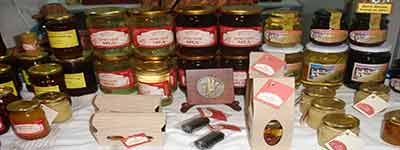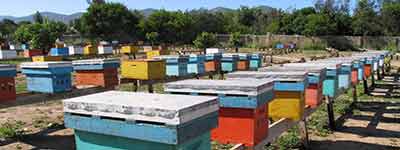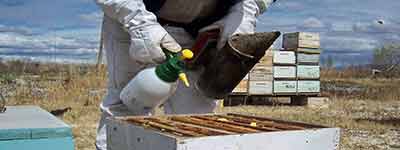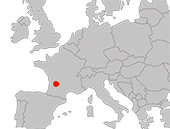Welcome to all
to the exciting world
of bees!
Invaluable source of information and services for all bee enthusiasts
|
Thanks to the indefatigable pollinating bees, beekeeping plays an essential role both in terms of agricultural yields and the maintenance of plant and tree biodiversity throughout the world. Scientists all agree that 35% of our food worldwide is dependent on their work! In addition bees provide different honeys as food supplements but also noble products used in apitherapy such as pollen, royal jelly, propolis, venom and wax. Via this website, the world's No. 1 portal for the apicultural sector, Apiservices offers beginner's articles, thousands of papers for professionals, scientific papers on the impact of pesticides on bees and databases on all topics related to bees, apiary techniques, treatments against apiary diseases, tricks against predators. Also listed are the coordinates of over a hundred beekeeping equipment suppliers for apiaries and honeyhouses, bee products, populated colonies, package bees and queens, veterinary drugs, service providers, apiculture trade unions and others. Welcome everybody! |
Last articles
Download PDF file >![]() < Preview PDF file
< Preview PDF file
Ellie Lobel was 27 when she was bitten by a tick and contracted Lyme disease. And she was not yet 45 when she decided to give up fighting for survival.
While wild bee populations are dwindling due to climate and environmental change, there has been a notable 45% rise globally in the number of managed honey bee (Apis mellifera) colonies over
the past five decades.
The new CAP framework enables potential interventions in the beekeeping sector, including advisory services, environmental actions, certification systems, and collective storage.
BeeLife has actively supported its members network by providing a position letter and an alert, encouraging them to engage with their respective national ministries to raise awareness and promote a coordinated response.
Honey bee populations are experiencing alarming declines due to a combination of biotic and abiotic stressors, including parasites, pathogens, habitat loss, pesticide exposure, and climate change.
The reasons for relocating honey bee colonies are often economic: to provide pollination services and/or to follow honeydew and nectar flows as they occur.
The largest Himalayan honeybee produces mad honey by feed in on wildflowers and mainly rhododendron flowers. It is mainly found in countries like Nepal and Turkey.
Varroa destructor sucks the blood from both the adults and the developing brood, weakening and shortening the life span of bees.
The EU beekeeping sector faces many challenges. On top of the ones posed by climate change, lack of forage resources, pollutants and the introduction of invasive species, beekeepers struggle to sell their main commercial product: honey.
While herbicide use in agriculture is expected to have many effects on surrounding weed communities, it is largely unknown how plant exposure to sublethal doses of herbicide may subsequently impact plant–pollinator interactions.
By the President of the Republic of Greece at the inauguration of Notre Dame Cathedral on December 7, 2024, coinciding with the opening of the Beekeeping Conference at the 15th Honey Festival.
The number seven is often called a magical, fairytale number, and on the seventh anniversary of the proclamation of World Bee Day by the United Nations (UN).
The EU beekeeping sector faces significant challenges, marked by competition from low-cost imports, rising production costs, and widespread fraud.
Apimondia statement on honey fraud is in the news!





































